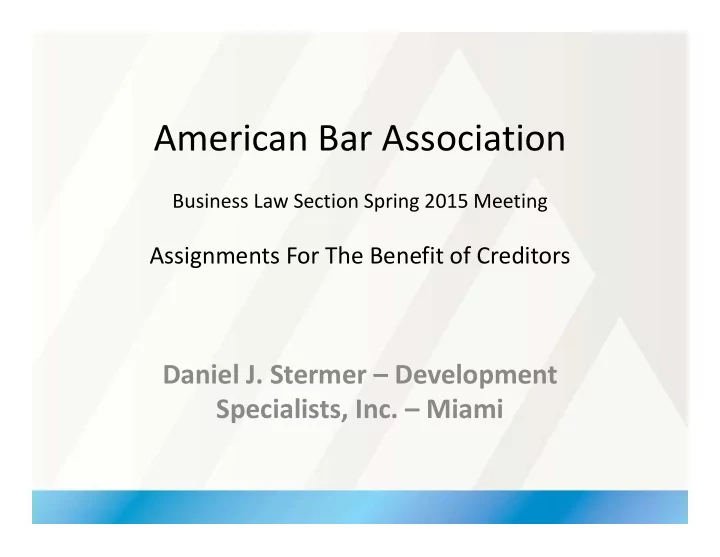

American Bar Association Business Law Section Spring 2015 Meeting Assignments For The Benefit of Creditors Daniel J. Stermer – Development Specialists, Inc. – Miami
Assignments For The Benefit of Creditors A general assignment provides a means of liquidating the assets of a Assignor in an orderly, controlled manner under state law. A general assignment is a vehicle used for the sale or liquidation of a business. It is not used to financially rehabilitate or “turn the business around.” General Assignments are either common law or statutory and the law varies from state to state as to which rule(s) govern. Generally, the states will follow one of two approaches to the assignment process: one approach requires court supervision of the assignment and the assignee; the other permits assignments to proceed without court supervision, but require that the Assignee follow whatever common law or statutory structure in that state as applicable to and governing the liquidation of a business and its assets . 2
Assignments For The Benefit of Creditors It is easy to think of assignments as the state law equivalent to Chapter 7. The assignment must be of all assets of the Assignor in order to qualify as a general assignment, otherwise the assignment is a specific assignment and common law and/or statutory law does not apply. The Assignee marshals the assets, liquidates the assets, and distributes the proceeds pursuant to the state’s distribution scheme. The applicability of federal priority pursuant to 31 U.S.C. §3713. As Assignee may have the power to pursue preferences depending upon the state law in which the assignment takes place. Fraudulent conveyances are subject to that state’s Uniform Fraudulent Transfer Act. Distributions made to creditors according to statutory priority and based on claims. 3
Assignments For The Benefit of Creditors The Assignee is generally someone who is not related to or directly involved in the management or day-to-day operations and affairs of the Assignor and should not be a creditor of the Assignor (i.e.: a disinterested third person). The Assignee is usually an individual experienced in the process of liquidating businesses; however, an Assignee may also be a corporate entity with such experience (depending upon state law). An Assignment is consummated when the Assignee accepts the Assignment Trust or “contact” from the Assignor. Upon acceptance of the assignment “contract,” all of the contracts, Assignor’s right, title, and interest in all of its assets are “transferred” to the Assignee for the purpose of liquidation. The Assignee becomes a fiduciary on behalf of any and all creditors of the Assignor. 4
Assignments For The Benefit of Creditors Where there is a blanket secured creditor, the Assignee must get that creditor’s consent to use and/or liquidate that creditor’s collateral. Assignee must use its business judgment when liquidating the assets. The transfer of assets is subject to any and all existing liens and the Assignee must validate any alleged secured claims. General assignments do not typically give an Assignor a discharge, as discharge of debts can only be achieved through a bankruptcy filing. State statutes that come close to giving bankruptcy type relief, like automatic stay, are invalidated by reason of the supremacy clause. The Assignee does not have the authority to dissolve to corporate entity. Employee benefit plans, such as 401(k) plans, are not assets of the Assignor; thus, the Assignee does not wind down those plans. 5
Assignments For The Benefit of Creditors The Board of Directors decision to commence an ABC versus a bankruptcy is generally driven by a number of considerations which should be vetted with the advice from counsel, including insolvency counsel. Considerations: Generally do not have to check the box about filing bankruptcy for SEC disclosure purposes Zone of insolvency and shifting of fiduciary duty by members of the BOD from shareholders to creditors Cost – usually less costly than bankruptcy Timing – usually faster than bankruptcy Not all situations are appropriate for ABCs 6
Recommend
More recommend